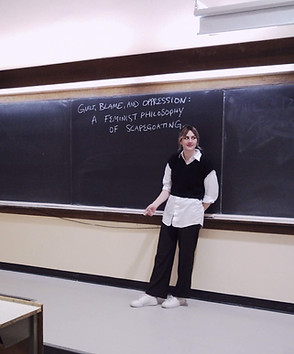Research
My research examines the politics of blame and responsibility, with special attention to ongoing oppressions, online dynamics, and the rise of AI.
I completed a PhD in Philosophy at McGill University in September 2022. My dissertation, "Guilt, Blame, and Oppression: A Feminist Philosophy of Scapegoating", is a work of social and political philosophy, with focus on social epistemology, ethics, feminist theory, and critical philosophy of race. My thesis develops a philosophical theory of scapegoating that explains the role of blame-shifting and guilt avoidance in the endurance of oppression. I argue that scapegoating, a concept as old as the Bible, offers potential insight into the means through which we shift blame onto marginalized groups and away from systems of oppression and those who benefit from them. I propose an ameliorative theory of scapegoating that accounts for deficiencies in prevailing theories of both oppression and scapegoating. On my account, scapegoating is made up of three sub-mechanisms: essentialization of marginalized groups as blameworthy, collective interest in protection against a threat, and social exclusion of the blamed. These sub-mechanisms work together to construct certain groups as scapegoats and encourage us to treat them accordingly through various structural and interpersonal means. In my final chapter I elaborate the epistemic dimensions of my theory of scapegoating to argue that scapegoating functions within our social imaginaries and structural epistemic practices.

My recent FRQSC-funded research project, "Blame and Shame on the Internet: Between Accountability and Exclusion", examined the internet as a shared social space that is rife with accusations, public shaming, and social exclusion. I believe that we have good reason to learn to recognize when (and if) we are weaponizing shame for good, and when we are acting unjustly. The public politics of accountability have brought about meaningful conversations (e.g., the #MeToo movement) and have allowed for groups that are traditionally marginalized to organize resistance against abuse and oppression. The use of blame and shame online is complicated by its usage as an activist strategy of moral reform by groups that have previously struggled to find a foothold of power. Ultimately, online practices of accountability, public blaming, or even ‘cancel culture’ are much more complicated than simply helpful or harmful. They require nuance, context, and historicity in order to be understood and harnessed for social good. My project involved an analysis of the intersections between the ethical and political impacts of blaming and shaming, with attention to a historical context of scapegoating and contemporary calls for accountability.
My current research places particular emphasis on the applied issues arising from scapegoating, social exclusion, and technology-facilitated shaming. I've written peer-reviewed and public-facing philosophy on online shaming, anti-trans legislation, the anti-abortion movement, and other applied issues. I’m currently co-editing a multi-authored collection under contract with Routledge, ‘Feminist Ethics: An Introduction to Fundamental Concepts and Current Issues’, which taps into the specializations of multiple diverse scholars to explain both long standing issues in feminist ethics and emerging questions in the field. Beyond theoretical contributions, the practical implications of my research include shedding light on the mental health impacts and societal consequences of online shaming, including the disproportionate impact of online hate on marginalized groups. My work seeks to inform public policies and interventions in our increasingly interconnected digital landscape.
Current papers I'm working on:
-
Anti-trans legislation as scapegoating (under review)
-
Salem to Social Media (forthcoming in The Witch: A Reader in Feminist Political Theory)
I am interested in collaborating! Philosophy doesn't have to be a solo sport. If you work on topics related to my research and have an idea you'd like to work on together, please reach out.
I've also consulted on ethics of AI, recently speaking on a panel Google Developer Groups (GDG) Burnaby’s #DevFest2024
I considered the questions:
Who is responsible when things go wrong? When AI systems are inscrutable and harms can come from intentional bad actors or unintended use, who do we hold to account?
I hold that the role of humanities is to determine what values are at play (privacy, autonomy, agency) in AI development - where they are operative, and what those values mean. Rather than ask "can we do this" we ask "should we do this?" And always consider: do we want this technology, who benefits from this technology, and what does this technology do to us?
.jpg)